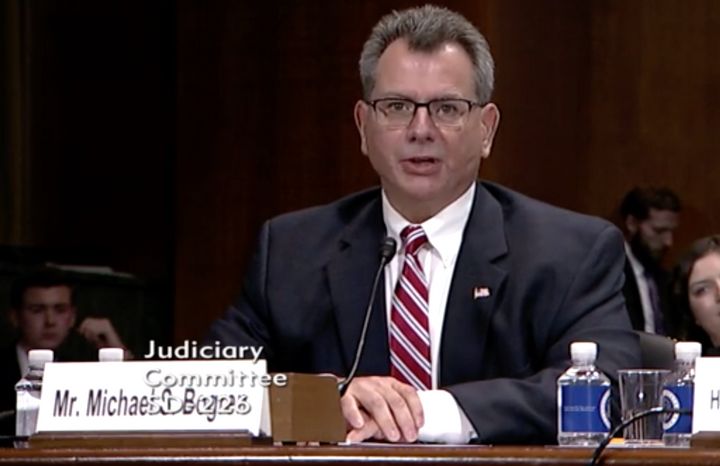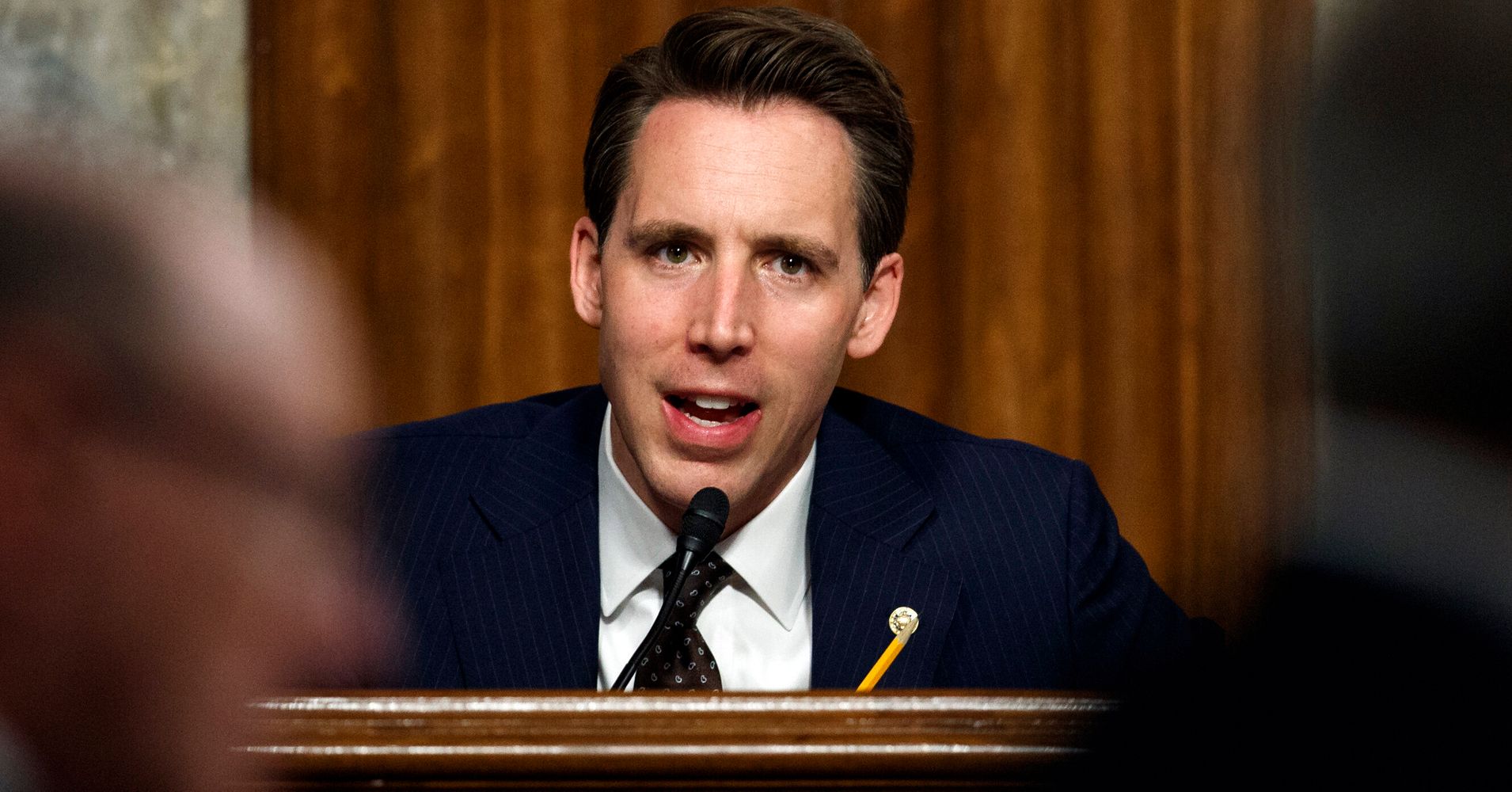[ad_1]
WASHINGTON ― Senate Republicans are finally standing up to President Donald Trump on the kind of judicial nominee they can’t support: a lawyer who defends his client.
Michael Bogren, Trump’s nominee to the U.S. District Court for the Western District of Michigan, announced in a scathing Wednesday statement that he’s withdrawing his name because his nomination is already toast, thanks to “gross mischaracterizations” about his legal work by some GOP senators.
“I have been accused of being anti-religious, anti-Catholic, and a religious bigot,” fumed Borgen. “It is truly unfortunate that what used to be a dignified process has sunk to this level.”
Three Republicans on the Judiciary Committee ― Sens. Josh Hawley (Mo.), Ted Cruz (Texas) and Thom Tillis (N.C.) ― were prepared to reject Bogren’s nomination because they didn’t like the way he once defended the city of East Lansing in a lawsuit involving a Catholic couple. The couple sued after being barred from a farmer’s market after they refused to a host a same-sex marriage on their farm, citing religious beliefs. In his legal defense of the city, Bogren, a managing partner at the law firm Plunkett Cooney, used analogies involving the Ku Klux Klan and imams who do not believe women should drive.
That argument is anti-Catholic bigotry and unacceptable, argued Hawley, who laid into Bogren in his May confirmation hearing.
“You compared in your brief a Catholic family’s adherence to the teachings of their church to the activities of the KKK and the teachings of radical imams,” Hawley said. “Do you stand by those statements?”
“Respectfully, that is not what I said and those are not my views,” Bogren replied, as Hawley repeatedly interrupted him. “The point I was trying to make was that religious beliefs trying to justify discrimination if extended to sexual orientation, which the city of East Lansing protects, could be used to try to justify any other sort of discrimination, whether it be gender or race.”
“You think that the Catholic family’s pointing to the teachings of their church is equivalent to a KKK member invoking Christianity?” pressed Hawley.
“From a legal perspective,” Bogren said, again talking through the senator’s interruptions, “there is no distinction.”

Cruz and Tillis soon joined Hawley in opposing Borgen, which left him without the votes to advance. And Hawley continued hammering Bogren this week, saying he should never have used a legal defense that involved “stooping” to the level of putting Catholics in the same sentence as the KKK.
“He said that the Catholic family was trying to dress up their argument in the shimmering robes of righteousness,” Hawley said Tuesday. “I mean, he really went after them in a nasty way. He questioned the sincerity of their faith. He told the press that this Catholic family might as well just put out a sign that says only whites need apply.”
Not only is it rare for Republicans to tank one of Trump’s court picks ― it’s only happened twice before, with Ryan Bounds and Thomas Farr ― but their threshold for deciding when someone isn’t fit to be a judge is officially somewhere between inconsistent and absurd, given how many right-wing ideologues and otherwise unqualified people they’ve confirmed to lifetime federal judgeships with little fanfare.
It is truly unfortunate that what used to be a dignified process has sunk to this level.
District court nominee Michael Bogren
The most high-profile of their questionable confirmations is Brett Kavanaugh, whom Republicans put on the Supreme Court despite an ugly, painful weekslong Senate fight over whether he has the temperament for the job (he cried, yelled and interrupted senators during his confirmation hearing) and whether women’s sexual misconduct allegations against him were credible and mattered.
Then there’s U.S. circuit judge Neomi Rao, who has blamed women for date rape and said a good way to avoid being raped is “to stay reasonably sober.” U.S. circuit judge Leonard Steven Grasz earned a rare “not qualified” rating by the American Bar Association because he was “unable to separate his role as an advocate from that of a judge” given his strong anti-LGBTQ and anti-abortion views. U.S. district judge Charles Goodwin was rated unqualified because he lacked “the ability to fulfill the demands of a federal judge” given his frequent absences from the courthouse in his former role as a magistrate judge. The ABA concluded U.S. district judge Holly Teeter simply lacked the trial court experience to be a federal judge.
GOP senators’ reasoning for opposing Bogren is also precisely what they accuse Democrats of unfairly doing: holding lawyers responsible for the positions they take on behalf of clients. Even some Republicans weren’t thrilled with this line of attack.
“I don’t think lawyers should be disqualified for positions they’ve taken on behalf of a client in court, in a legal argument,” Sen. John Cornyn (R-Texas), who is a former state Supreme Court justice, told reporters this week. “That’s just my point of view, based on my 13 years on the bench.”
Some conservative commentators were unhappy, too.
“Do conservatives really want to embrace the general proposition that arguments that a lawyer makes on behalf of a client should, without more, be held against the lawyer?” wrote Ed Whelan, president of the right-leaning Ethics and Public Policy Center. “That’s a proposition that, apart from being unsound, could redound to the detriment of conservative nominees who have defended religious liberty or pro-life legislation in unpopular contexts.”
Hawley’s line of attack didn’t come out of nowhere, though. It tracks with a campaign being pushed by an unofficial network of conservative, well-funded groups quietly working together to frame any questions about a judicial nominee’s beliefs in abortion or LGBTQ rights as anti-religious bigotry. As detailed in an extensive report by The Nation, the network, fueled by tens of millions of dollars in dark money donations, includes Federalist Society executive Leonard Leo, who personally recommended both of Trump’s Supreme Court picks along with lots of his other court nominees.
A White House spokesman did not respond to a request for comment on whether Trump plans to officially withdraw Bogren’s nomination and whether White House officials are mad that Republicans sunk his nomination.
Igor Bobic contributed reporting.
REAL LIFE. REAL NEWS. REAL VOICES.
Help us tell more of the stories that matter from voices that too often remain unheard.
[ad_2]
Source link

